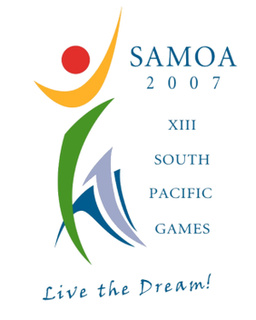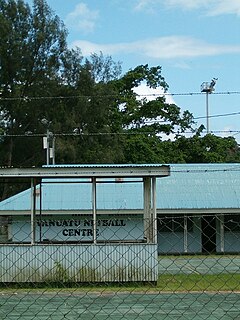Related Research Articles

Netball is a ball sport played by two teams of seven players. Netball is most popular in many Commonwealth nations and according to the INF, netball is played by more than 20 million people in more than 80 countries. Major domestic leagues in the sport include the Netball Superleague in Great Britain, Suncorp Super Netball in Australia and the ANZ Premiership in New Zealand. Four major competitions take place internationally: the quadrennial World Netball Championships, the Commonwealth Games, and the yearly Quad Series and Fast5 Series. In 1995, netball became an International Olympic Committee recognised sport, but it has not been played at the Olympics.

Netball is the most popular women's team participation sport in Australia. In 1985, there were 347,000 players. In 1995, there were over 360,000 Australian netball players. Throughout most of Australia's netball history, the game has largely been a participation sport; it has not managed to become a large spectator sport. In 2005 and 2006, 56,100 Australians attended one to two netball matches. Of these, 41,600 were women. 46,200 attended three to five netball matches, with 34,400 of those spectators being women. 86,400 attended six or more netball matches, with 54,800 spectators being female. Overall, 188,800 people attended netball matches, with 130,800 being female. In 2005 and 2006, netball was the 10th most popular spectator sport for women with Australian rules football (1,011,300), horse racing (912,200), rugby league (542,600), motor sports (462,100), rugby union (232,400), football (212,200), harness racing (190,500), cricket (183,200) and tennis (163,500) all being more popular. The country set an attendance record for a netball match with a record crowd of 14,339 at the Australia–New Zealand Netball Test held at the Sydney Super Dome game in 2004.
Sports in American Samoa are slightly different from sports in Samoa. The main difference is that Samoans in American Samoa are more likely to follow or play American sports such as American football, basketball, and baseball. Western Samoans are more likely to follow or play rugby union, rugby league, and netball. Sports such as mixed martial arts, boxing, professional wrestling, and volleyball are popular among most ethnic Samoans regardless of location.

Afega is a village on the island of Upolu in Samoa. It is located on the central north coast of the island to the west of the capital Apia in the countryside. The population is 1998.

The 2007 South Pacific Games were held in Apia, Samoa, from 25 August to 8 September 2007. The Games were the thirteenth to be held since the inception of the South Pacific Games in 1963, and included traditional multi-sport event disciplines, such as athletics and swimming, alongside region-specific and smaller events such as outrigger canoeing, surfing and lawn bowls.

Rugby league is the national sport and most popular sport in the Cook Islands, with soccer and rugby union as the next most popular/played sports. In September 2009, the Cook Islands hosted the 2009 Pacific Mini Games. Cook Islands Sports National Olympic Committee is the official governing body of sport in the Cook Islands. www.cookislandssports.com

The most popular sport in Oceania varies from country to country. The most popular sport in Australia is cricket, the most popular sport among Australian women is netball, while Australian rules football is the most popular sport in terms of spectatorship and television ratings. Rugby is the most popular sport among New Zealanders. In Papua New Guinea, the most popular sport is the Rugby league.

The Cook Islands compete as a part of netball's Oceania region. More than 1,000 players have registered to play the sport. Participation in the game grew during the 1970s. Much of this is possible because of the national governing organisation, the Cook Islands Netball Association which is a member of Oceania Netball Federation. Because of the level of organisation and the game's development, the country has participated at several international events including the Pacific Games, the Commonwealth Games, the World Games, the Oceania Netball Tournament, the World Youth Netball Championship, and the International Challenge Men's and Mixed Netball Tournament. A demonstration of the Cook Islands success can be found by looking at the national team: It is one of the top ranked in the world.

Netball in Fiji is a popular sport, with a men's and a women's national team. Netball games are most often played by girls on Saturdays during the winter, though games can be played at all times of the year. Women's participation in netball is comparable to men's participation in rugby.
Netball in Niue is a popular local sport. Games are most often played by girls on Saturdays between June and August, though games can be played at all times of the year. Most of the netball is played on high school athletic grounds.
Netball in Tonga is a popular sport, usually played by girls on Saturdays during the winter, though games can be played at all times of the year.

Netball has a large amount of grassroots support in Vanuatu. Games are most often played by girls on Saturdays during the winter, though games can be played at all times of the year. Continuing growth of the game in Vanuatu was at times hampered by the fact that the sport is not an Olympic one. The Olympic Solidarity Movement provides much access to funding through the International Olympic Committee. For Olympic sports, money can be tapped to help cover costs for inter-island travel for international competitions. The lack of netball being recognized meant it was hard to find money to cover these costs.
Papua New Guinea Netball Federation was created in the 1960s. There are over 10,000 registered netball players in the country. A large support base for the sport exists around Port Moresby.

Netball is one of the most popular women's participation sports in South Africa. The sport is also played by a large number of men. It exists in a culture where sport plays an important public and social part of life. The history of South Africa's netball involvement mirrors that of other sports played in the country like rugby union. During the apartheid era, there were many netball facilities available for whites to use, and fewer for people from other race groups. Funding issues and gender issues did not help bridge this gap.
Netball has never been played at the Summer Olympics, but its federation has been recognized by the International Olympic Committee (IOC), since 1995 after a twenty-year period of lobbying. The netball community sees netball's absence at the Olympic Games as a hindrance to the global growth of the game, depriving it of media attention and funding. The IOC requires a high geographical scope for inclusion in the Olympics, but netball is mostly played in Commonwealth countries. When the IOC recognized netball's federation, it opened up sources of funds that the global netball community had not been able to access before, including the (IOC), national Olympic committees and sports organisations, and state and federal governments.

Netball is a popular women's sport in parts of Africa. Several African nations are ranked amongst the top thirty in the world. As of August 2016, South Africa was ranked number Five, Malawi was ranked number Six, Uganda was ranked Seven, Zambia was ranked Sixteenth, Botswana was ranked twentieth, Zimbabwe was ranked Twenty-first and Swaziland was ranked Thirtieth in the world.

Netball in Oceania is generally regarded as a woman's sport. Women's sports in Oceania have traditionally had a very low profile. Despite this, netball is popular in Oceania, with its growth partly because of New Zealand encouraging the game and providing money for the training of coaches, umpires and other netball development needs. In New Zealand and in neighbouring Australia, netball is one of the most popular sports played by women.

Netball is a popular participant sport in some parts of the world, particularly in countries of the Commonwealth of Nations. According to the IFNA, over 20 million people play netball in more than 72 countries. IFNA member nations are divided into five regional groups: Africa, America, Asia, Europe and Oceania.

On the club, national and international level, men's netball teams exist, but attract less attention than women's netball. Mixed teams are not uncommon in Australia and are very popular. Men's national teams do exist in Brunei, Canada, England, Fiji, Hong Kong, India, Isle of Man, Jamaica, Kenya, Malaysia, Pakistan, Papua New Guinea, Singapore and the UAE.

The 2017 Pacific Mini Games were held in Port Vila, Vanuatu, in December 2017. It was the tenth edition of the Pacific Mini Games, and the second to be hosted in Vanuatu.
References
- 1 2 3 MacKinnon 2009 , p. 51
- ↑ Lal & Fortune 2000 , p. 458
- ↑ International Netball Federation. "Current World Rankings". Last updated 20 August 2016.
- ↑ Samoa Observer 2011
- ↑ Symons & Hemphill 2006 , p. 122
- ↑ Lal & Fortune 2000 , p. 462
- ↑ SportingPulse profile